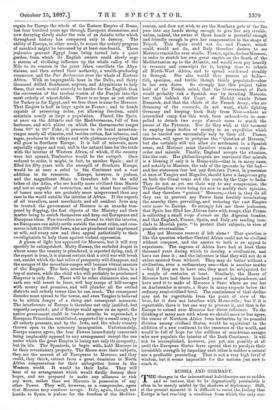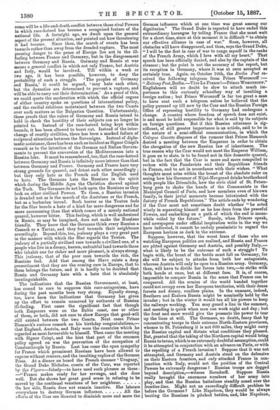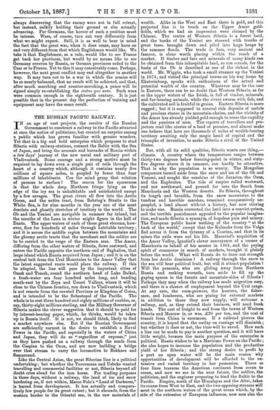RUSSIA AND GERMANY.
THEchanges in the international kaleidoscope are so sudden and so various, that to be dogmatically pessimistic is often to be merely misled by the shadows of diplomacy. Still, at the present moment it is difficult to resist the feeling that Europe is fast reaching a condition from which the only out-
come will be a life-and-death conflict between those rival Powers in which race-hatred has become a recognised feature of the
national life. A fortnight ago, We dwelt upon the general
aspect of the present situation, and pointed out how threatening it had become. Since then, the march of events has been towards rather than away from the dreaded rapture. The most pressing danger to the peace of Europe lies not in the ill- feeling between France and Germany, but in the disagreement between Germany and Russia. Germany and Russia at war means a general conflict in which not only France, but Austria and Italy, would be involved. Till within a week or two ago, it has been possible, however, to deny the probability of such a struggle. The peoples of Germany and Russia,' it could be argued, may hate each other, but the dynasties are determined to prevent a rupture, and will be able to carry out their determination.' As a proof of this, we could quote the moderation with which the official organs of either country spoke on questions of international policy, and the cordial relations maintained between the two Courts over such matters as the Bulgarian Question. Unfortunately, these proofs that the rulers of Germany and Russia intend to hold in check the hostility of their subjects can no longer be pointed to. Instead of the race-hatred being kept within bounds, it has been allowed to burst out. Instead of the inter- change of courtly civilities, there has been a marked failure of reciprocal attentions between the Sovereigns. Instead of diplo- matic assistance, there has been such an incident as Signor Crispi's remark as to the intention of the German and Italian Govern- ments to prevent the conversion of the Mediterranean into a Russian lake. It must be remembered, too, that the race-hatred between Germany and Russia is infinitely more intense than that between Germany and France. Germany and France have very strong grounds for quarrel, and detest each other accordingly ; but they only hate as the French and the English used to hate. The Germans hate the Russians in the spirit which during the Middle Ages the Christian showed against the Turk. The Germans do not look upon the Russians as they look on other civilised Powers. To them, a Russian invasion is dreaded not as is the march of the Austrians or the French, but as a barbarian inroad. Such horror as the Teuton feels for the Slav breeds a hate of a kind far more dangerous and far more unreasoning than that which comes of a merely national quarrel, however bitter. This feeling, which is well understood in Russia, as may be imagined, does not make the Russians friendly. They know that the Germans think every Russian a Cossack or a Tartar, and they feel towards their neighbours accordingly. Beyond this, too, jealousy plays a very great part in the manner with which the Slav regards the Teuton. The jealousy of a partially civilised race towards a civilised one, of a people who live in a dreary, barren, unfruitful land towards those who inhabit one far richer and more pleasant, is always strong. This jealousy, that of the poor man towards the rich, the Russians feel. Add that among the Slays exists a deep presentiment that they are the coming race in Europe, that to them belongs the future, and it is hardly to be doubted that Russia and Germany hate with a hate that is absolutely inextinguishable. The indications that the Russian Government, at least, has ceased to care to suppress this race-antagonism, have during the past months been very strong. Equally strong, too, have been the indications that Germany has given up the effort to remain unmoved by outbursts of Russian ill-feeling. First came the significant fact that though both Emperors were on the Baltic coast, one or other of them, or both, did not care to show Europe that good-will still existed between the two Courts. Next came Prince Bismarck's curious remark on his birthday congratulations,— that England, Austria, and Italy were the countries which he regarded as most favourable to himself. Then came the meeting with Signor Crispi, and the hint that part of the common policy agreed on was the prevention of the occupation of Constantinople by Russia. Last has come the open sympathy for France which prominent Russians have been allowed to express without censure, and the insulting replies of the German Press. At a dinner on board the French steamer Uruguay,' the Grand Duke Nicholas, cousin of the Czar, was reported by the Figaro—falsely—to have used such phrases as these : —"France makes ready for her revenge, and she does well. But she shows her great good sense in refusing to be moved by the continual vexations of her neighbour On her side, Russia does not remain inactive. She labours everywhere to destroy German influence All the efforts of the Czar are directed to diminish more and more the German influence which at one time was great among our dignitaries." The Grand Duke is reported to have ended this extraordinary harangue by telling France that she must wait for a short time, since at this moment it is difficult " to obtain our effective alliance in case of war." Soon, however, all obstacles will have disappeared, and then, says the Grand Duke, "I will be the first in case of war to range myself in the ranks of the French Army, which I love with all my heart." That speech has been officially denied, and also by the captain of the
steamer ; but the point is not the accuracy of the report, but its reception in Germany, where it was at once accepted as certainly true. Again, on October 10th, the Berlin Post re-
ceived the following telegram from Prince Woronzoff :—
" Zeitung Post, Berlin.—Vive La France l—Prince WOBONZOFF." Englishmen will no doubt be slow to attach much im-
portance to this curiously schoolboy way of insulting a foreign nation ; but Prince Woronzoff is far too great a man to have sent such a telegram unless he believed that the policy pursued up till now by the Czar and the Russian Foreign Office of repressing hostility to Germany had undergone a change. A country where freedom of speech does not exist, is and must be held responsible for what is said by its subjects on foreign questions. But if this Russian utterance is sig- nificant, of still greater importance is an article, said to be in the nature of a semi-official communication, in which the Cologne Gazette disposes of the rumour that Prince Bismarck desired a meeting between the Emperors in order to obtain the abrogation of the new Russian law of inheritance. The true reason why the Czar would not meet the Emperor William, it goes on to state, is to be found not in this domestic quarrel, but in the fact that the Czar is more and more compelled to reckon with the Panslavists and their Republican friends in France, and to act in accordance with their wishes. "What thoughts must arise within the breast of the absolute ruler on seeing how his Governor of Nijni-Novgorod drinks brotherhood with people like Deroulede, how the civic chief of St. Peters- burg goes to shake the hands of the Communists in the Municipal Council of Paris, and how members even of his own family, in their jovial moments become intoxicated with the flattery of French Republicans." The article ends by wondering if the Czar must not sometimes doubt whether "he acted wisely in separating himself as he has done from the peaceful Powers, and embarking on a path of which the end is mean- while veiled by the future." Surely, when Princes speak, and newspapers under official inspiration write in the way we have indicated, it calm& be unduly pessimistic to regard the European horizon as dark in the extreme.
Suppose, however, that the worst fears of those who are watching European politics are realised, and Russia and France are pitted against Germany and Austria, and possibly Italy,— what is likely to be the outcome of such a struggle To begin with, the brunt of the battle mat fall on Germany, for she will be subject to attacks from both her antagonists, whereas Austria will only be open to a Russian army. Germany, then, will have to divide her forces into two,—to strike with both hands at once, but at different foes. It is, of course, impossible to conquer Russia in the sense that France can be conquered. All the armies of the world banded together could not occupy even her European territories, with their dense forests and dreary, roadless plains. In the summer, indeed, Southern and Eastern Russia might be nominally held by the invader ; but in the winter it would tax all his powers to keep the railways working. You may guard a line in the summer, and mending is quick when men can work night and day ; but the frost and snow would give the peasants the power to tear up the lines at will. The Germans, no doubt, fancy that by concentrating troops in their extreme North-Eastern provinces, whence to St. Petersburg it is not 600 miles, they might carry the Russian capital and dictate what conditions they pleased. But, granted that the taking of the Northern capital would bring Russia to terms, which is an extremely doubtful assumption, could it be attempted in conjunction with an advance on Paris, or with the repelling of a French invasion? Suppose that it was not attempted, and Germany and Austria stood on the defensive on their Eastern frontiers, and only attacked France in con- junction with Italy, would not the position of the Central Powers be extremely dangerous? Russian troops are dogged beyond description,—witness Zorndorff. Suppose Ramia really brought the enormous numbers of her army into play, and that the Russian battalions steadily oozed over the frontier-line. Might not an exceedingly difficult problem be before the Germans Like Napoleon, they would be always beating the Russians in pitched battles, and, like Napoleon, always discovering that the enemy were not in full retreat, but instead, sulkily holding their ground or else actually advancing. For Germans, the horror of such a position must be intense. Wars, of course, turn out very differently from what we might expect. Still, it is as well to bear in mind the fact that the great war, when it does come, may have an end very different from that which Englishmen would like. We take it that Englishmen, as a rule, would like to see France get back her provinces, but would by no means like to see Germany overrun by Russia, or German provinces ceded to the Czar or to France. Yet to this it may conceivably come. Perhaps, however, the next great conflict may end altogether in another way. It may turn out to be a war in which the armies will be so nearly balanced, that no result will be achieved, and that, after much marching and counter-marching, a peace will be signed simply re-establishing the status quo ante. Such wars were common enough in the eighteenth century. It is just possible that in the present day the perfection of training and equipment may have the same result.




































 Previous page
Previous page